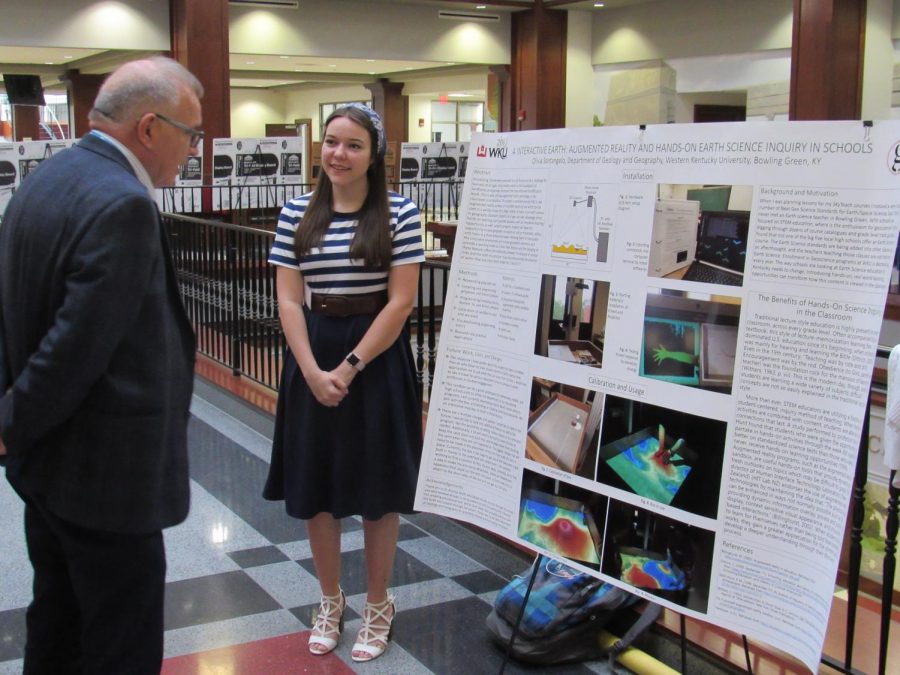Earth science education sees drop, says research institute
December 4, 2018
When WKU SkyTeach senior Olivia Santangelo chose earth space science as her concentration, she didn’t know she was the first science education major at WKU to do so in nearly a decade. Now, more than three years later, the concentration will no longer be offered after Santangelo graduates in May.
“Earth science is ridiculously important, especially with climate change, but it’s kind of difficult,” Santangelo said. “I do see where they’re coming from. If there’s only one student interested every several years, why continue to allocate resources?”
Geography and geology department chair Fred Siewers said the reason for low interest in geosciences at WKU is because earth science is not taught in high schools. Some high schools offer integrated science courses, which include earth science, but it’s not the sole focus of the course.
Santangelo’s school, Dixie Heights High School, was an exception. She said she’s known she wanted to teach for a long time, and when she took a geology elective at Dixie Heights, she knew that was the subject she wanted to focus on.
“It’s just science that you can touch,” she said. “It’s just not as theoretical because [with] chemistry there’s a lot of stuff you can’t see, you just kind of have to trust that it’s there, and it’s the same with biology. In geology, you can really get out in the field and get hands on.”
Santangelo said she feels SkyTeach has prepared her with skills to teach, although, she has observe mainly in biology classes. Next semester she’ll have to commute 40 minutes to student teach in a high school with her subject.
The WKU Department of Geography & Geology began phasing out the earth space science program because of low enrollment. Santangelo will be the last to graduate from the program, Siewers said.
In 2017, WKU had 74 students working toward a bachelor’s degree in meteorology, according to the 2018 Fact Book. Siewers said meteorology is one major the department has never had to recruit for its high enrollment. Thirty students were enrolled in the geology major in 2017, and 38 in geography/environmental studies.
While not as many students major in geology or geography, Siewers said the number of students taking courses in the department related to the cost is OK because of how many students take general education courses.
Departments across every college at WKU are conducting program reviews this year to evaluate whether they are meeting the needs of students.
Some programs like Santangelo’s have been phased out because of low enrollment. By fall of 2021, the Department of Modern Languages will no longer offer the French major. There were 22 students working toward a bachelor’s degree in French at WKU as of 2017, according to the 2018 Fact Book.
“I think that our program should be maintained, and maybe a case or two to be transformed or kind of realigned or rethought to meet the current needs,” Siewers said.
Santangelo said she knows the department’s numbers are decreasing and has had professors encourage students to send anyone who might be interested in a geoscience major their way.
“The geosciences in general—I think meteorology is doing pretty well—but the others I feel like people don’t know are viable career options,” she said.
The American Geosciences Institute predicts a net deficit of more than 135,000 geoscientists by 2022 because the total number of graduates is not enough to replace the retiring generation of geoscientists. Fields include teachers, geographers, hydrologists, petroleum technicians, mining engineers, environmental engineers and soil and plant scientists.
Santangelo said earth science is so important now because of how hard climate scientists have to fight to get people to accept the truth about climate change.
“This is a very widely accepted fact that is for some reason really hard to grasp for a lot of people, and I think that’s because there’s such a lack of basic earth science processes,” she said. “There’s not a lot of understanding into why things are the way that they are.”
An earlier version of this article attributed information to the Incorporated Research Institutions for Seismology. The research is by the American Geosciences Institute. The Herald regrets the error.
Print managing editor Emma Austin can be reached at 270-745-0655 and [email protected]. Follow her on Twitter at @emmacaustin.
























